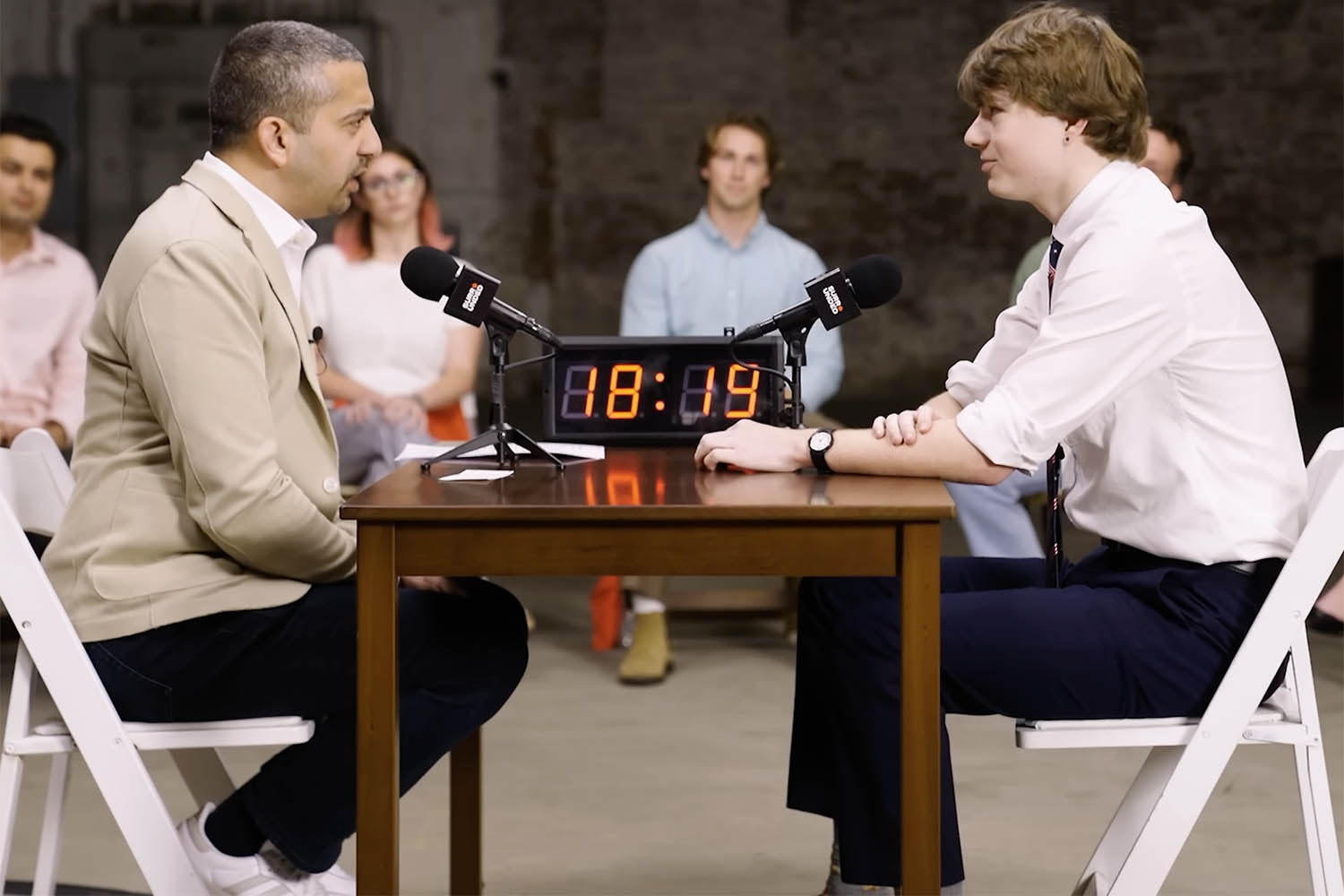Few ideas are looking quite so tattered as the notion that the best way to change minds and elevate discourse is through debate. Head-to-head showdowns between opposing political arguments have, in the past decade, degenerated to a point beyond respect or reason, doing little other than apparently burrowing opponents deeper into their pre-existing views. The internet has only exacerbated this polarised reality. None of this is new.
Which is why many were confused when the progressive British-American commentator Mehdi Hasan agreed to a two-hour battle royale against 20 hard-right individuals on subjects such as race, immigration and crime – hosted on YouTube by the digital media company Jubilee.
The title, 1 Progressive vs 20 Far-Right Conservatives, was ultimately a euphemism for what awaited after you clicked: a series of dead-end shouting matches where Hasan encountered people who described themselves, literally, as fascists, knowingly cited Nazi theorists and who applauded one another for statements such as “whites are Native American”. In two days, it has been viewed on YouTube alone more than 5m times, which doesn’t account for the countless clipped versions still going viral across social media.
The power of debate may be in the gutter – but Jubilee is thriving. Founded as a non-profit body in 2010, it has become infamous for hosting these antagonistic, gladiatorial, hours-long political debates on divisive topics online, under the banner of the company’s slogan: “Provoke understanding and create human connection.” It has made many series since becoming for-profit in 2017, including ones about dating and romance as well as simpler gameshow-style shows.
But its most popular and notorious format, by far, is Surrounded, in which one figure sits in the centre of a circle of 20-plus adversaries and, Colosseum-style, debates with them one-by-one about a variety of predetermined topics. Previous episodes include: 1 Conservative vs 20 Feminists (6.2m YouTube views, featuring right-wing talking head Candace Owens), 1 Atheist vs 25 Christians (9.1m views, featuring YouTuber and podcaster Alex O’Connor), 1 Politician vs 25 Undecided Voters (3.1m views, with former Democratic presidential candidate Pete Buttigieg) and 1 Republican vs 25 Kamala Harris Voters (15m views, featuring alt-right commentator Ben Shapiro).
These episodes have drawn so many viewers in part due to their semi-famous guests. But episodes with small-time influencers have been just as successful. 1 LGBTQ+ Activist vs 25 Conservatives has more than 2m views; a doctor debating with 20 anti-vaxxers has just shy of 10m. They will even repeat the same formula, swapped (an episode where Jordan Peterson debates with 20 atheists currently has over 7m views).
It’s a perfect, 2025 blend of reality TV, our current sociopolitical climate and, importantly, infinitely clippable media. Despite the views on the main videos, most people encounter Jubilee as shortform content on TikTok, Instagram, X or as YouTube Shorts, either showing a right-winger “owning” a liberal or vice versa, depending on which side of the internet you frequent.
We have known for a decade that no matter how squarely a debate is won, the “losing” side can easily chop up and warp moments to make the opposite appear true. Feigning ignorance about this media manipulation is laughable. So what is anyone getting from this, aside from a few moments of catharsis affirming and entrenching their beliefs before scrolling to the next 40-second video?
This content also bolsters an ongoing global movement: the platforming of hard-right views creeping up around all sides of popular culture – stretching the Overton window [the range of topics deemed acceptable by the public] to the point where people are happy to applaud others and self-identify to millions online as fascists. As entertainment masquerading as politics, it quietly follows the rule that, if you’re going to keep making the same programme, the ante must be upped progressively to hold on to viewers.
Participating, even if it pushing against those ideas, is hard to justify. Hasan argues he wasn’t aware the views would be quite so extreme in his episode, saying: “That’s not how the debate was sold to me. You can see my shock when they start expressing their views openly.” But he has also just founded a digital media company, Zeteo. This has undoubtedly been a powerful way to promote it.
Newsletters
Choose the newsletters you want to receive
View more
For information about how The Observer protects your data, read our Privacy Policy
Extremism is lucrative. And given the pushback against moderation since November, it is monetisable online. For Jubilee, this episode will be chalked up as a slam dunk, helping it cruise even closer to mainstream popularity. But to continue, the stakes will have to get higher. In January, Jubilee’s former creative director John Regalado told The Atlantic the company had toyed with an episode on Holocaust Survivors vs Holocaust Deniers something Regalado said, in the right context, he supported.
We should only expect more content moving rapidly in this direction. But, in response, we must resist the tempting delusion that, with the right argument, we can “provoke understanding”. Participation only greases the wheels of content designed to drive shock engagement – not to change anyone’s mind.

